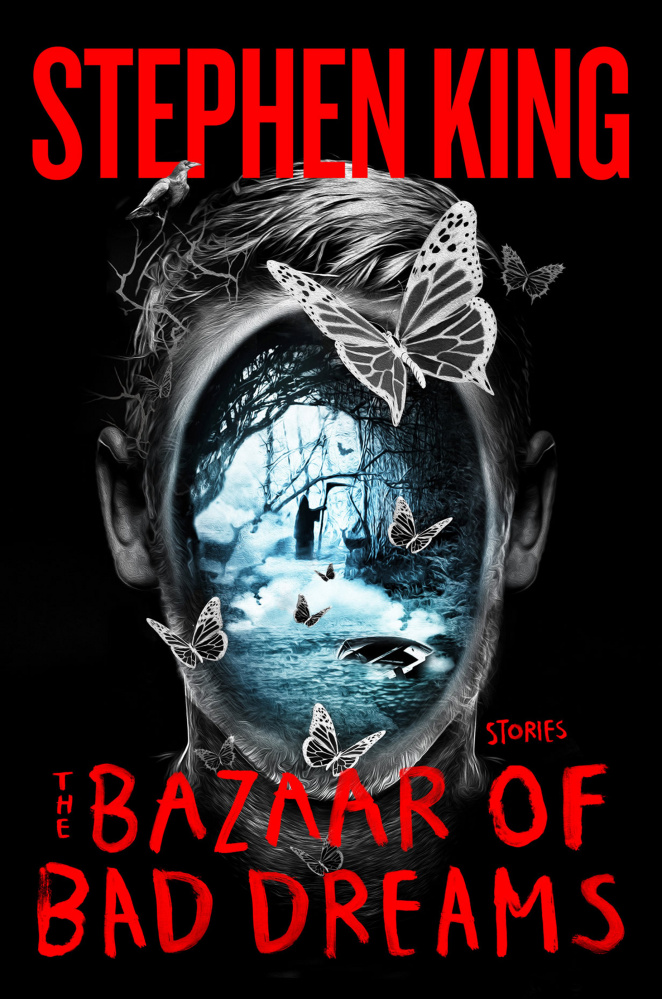Stephen King taps economic uncertainty and his own deep well of creativity to create 20 unsettling stories.
Stephen King is a novelist at heart. He says so right at the start of “The Bazaar of Bad Dreams,” his new collection of shorter work. But even as one acknowledges his mastery of the long form in books like “The Stand” or “11/22/63,” it is possible to argue that King is at his most inventive when he works at the other end of the word-count spectrum.
In the introduction to his first collection in seven years, King calibrates the appeal of the story over the novel. He writes, “But there’s something to be said for a shorter, more intense experience. It can be invigorating, sometimes even shocking, like a waltz with a stranger you will never see again, or a kiss in the dark, or a beautiful curio for sale laid out on a cheap blanket at a street bazaar.”
“The Bazaar of Bad Dreams” offers 20 unsettling narrative curios, including two poems and a few novellas. Some are straightforward chillers, while other selections take the author and his readers into stranger, more experimental territory.
King specializes in the brand of horror perfected by Richard Matheson, Charles Beaumont and other scriptwriters for Rod Serling’s “The Twilight Zone,” in which some regular guy or gal connects with the otherworldly in a fashion that is compelling, if not always well explained. In this mode, there’s usually a twist in the story’s tail or at least a heavy load of irony.
“The Bazaar of Bad Dreams” opens with just such a supernatural tall tale, “Mile 81,” a novella in which something evil arrives at an abandoned freeway rest stop. Plausibility isn’t high on this story’s list of virtues, but there’s plenty of good, creepy fun to be had, nevertheless.
King has no problem spinning outlandish dark fantasies fueled by clever exercises in “what if?” In “Bad Little Kid,” a convicted murderer on the eve of his execution recounts how his life has been haunted by a demonic elementary schooler. In “Ur,” an instructor at a mediocre Midwestern college receives a pink Kindle that provides access to publications from millions of parallel universes.
Perhaps the best of the straightforwardly creepy bunch is “The Dune,” about an elderly judge who discovers portentous writing in the sand near his Florida home. The story is a nasty little gem with a delicious kick at the end.
King’s previous collection, “Just After Sunset,” was published just at the start of the Great Recession. Many of the stories in “The Bazaar of Bad Dreams” reflect an emphasis on a different kind of terror, one that comes from the contemplation of economic chaos. The stories focus on working class people negotiating a universe that seems to operate actively against them at every turn.
In “Premium Harmony,” written after King read more than two dozen Raymond Carver stories in a short span of time, a simple stop for gas degenerates into tragedy for a bickering married couple running out of money, patience and time. “Batman and Robin Have an Altercation” describes the fractured relationship between a middle-aged son and his demented father and how an episode of road rage forces a shift in perspective. “Drunken Fireworks” adopts a more humorous tone as it describes an escalating cold war in which a mother and grown son living in a rural Maine cabin face off against the well-connected and well-heeled summer people who reside in luxury on the opposite side of the lake.
Perhaps the bleakest story in the book is “Herman Wouk Is Still Alive,” in which two single mothers use a lottery windfall as an excuse to pack their seven children into a rented Chevy van for a road trip up I-95. With his ear for realistic dialogue and eye for the indelible detail, King juxtaposes the women’s ill-fated excursion with the lunchtime conversation of a pair of elderly poets who will witness the abrupt end of the journey. It’s a brutal juxtaposition between the haves and have-nots, made more so by the understanding that the story was inspired by a real-life incident.
“The Bazaar of Bad Dreams” is another solid compendium of weird tales from an undisputed master of the form. A few of the selections travel way outside the mark (The baseball yarn “Blockade Billy” might work better at half its length) but most land well within the strike zone. A handful of special ones (“Morality,” “That Bus Is Another World”) curve and dip so you can’t be sure where they’ll end up.
It may be seven more years before King delivers another collection such as this one. Depending on how ordinary people continue to fare in the face of harsh reality, his topics of concern may shift in the meantime, as may those of his audience. Readers can be thankful, however, that he’s still out there pitching stories with all the craft and guile he can muster.
Berkeley writer Michael Berry is a Portsmouth, New Hampshire, native who has contributed to Salon, the San Francisco Chronicle, New Hampshire Magazine, the Los Angeles Review of Books and many other publications. He can be contacted at:
mikeberry@mindspring.com
Twitter: mlberry
Send questions/comments to the editors.




Success. Please wait for the page to reload. If the page does not reload within 5 seconds, please refresh the page.
Enter your email and password to access comments.
Hi, to comment on stories you must . This profile is in addition to your subscription and website login.
Already have a commenting profile? .
Invalid username/password.
Please check your email to confirm and complete your registration.
Only subscribers are eligible to post comments. Please subscribe or login first for digital access. Here’s why.
Use the form below to reset your password. When you've submitted your account email, we will send an email with a reset code.